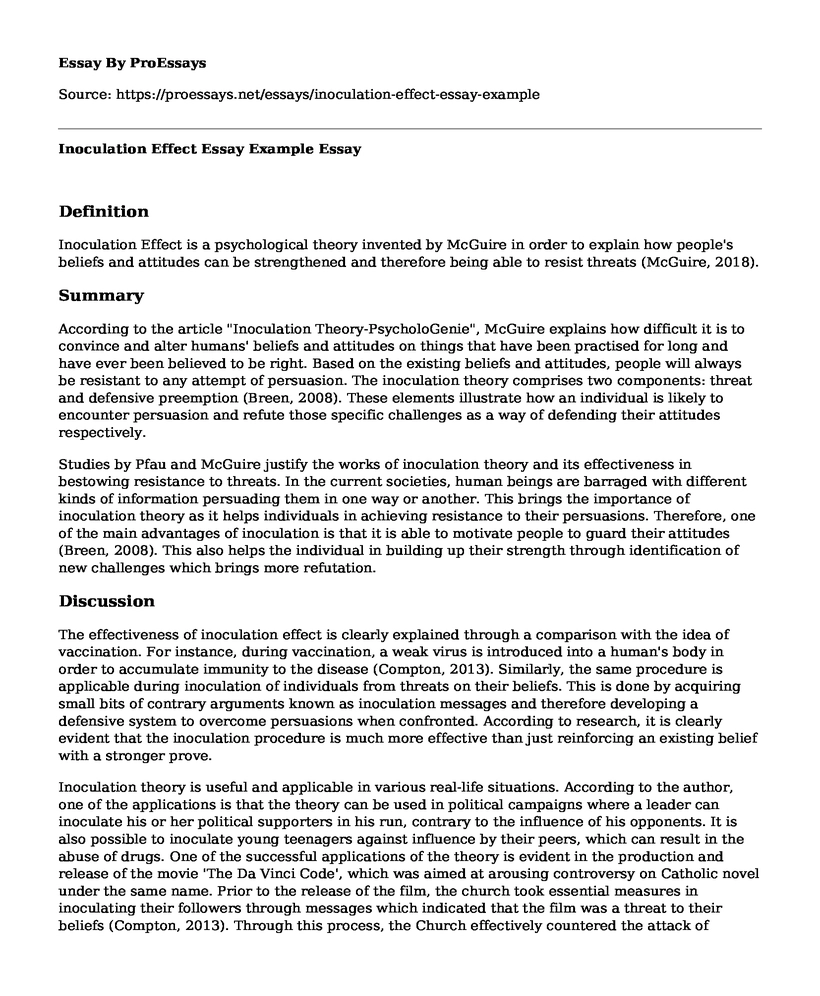Definition
Inoculation Effect is a psychological theory invented by McGuire in order to explain how people's beliefs and attitudes can be strengthened and therefore being able to resist threats (McGuire, 2018).
Summary
According to the article "Inoculation Theory-PsycholoGenie", McGuire explains how difficult it is to convince and alter humans' beliefs and attitudes on things that have been practised for long and have ever been believed to be right. Based on the existing beliefs and attitudes, people will always be resistant to any attempt of persuasion. The inoculation theory comprises two components: threat and defensive preemption (Breen, 2008). These elements illustrate how an individual is likely to encounter persuasion and refute those specific challenges as a way of defending their attitudes respectively.
Studies by Pfau and McGuire justify the works of inoculation theory and its effectiveness in bestowing resistance to threats. In the current societies, human beings are barraged with different kinds of information persuading them in one way or another. This brings the importance of inoculation theory as it helps individuals in achieving resistance to their persuasions. Therefore, one of the main advantages of inoculation is that it is able to motivate people to guard their attitudes (Breen, 2008). This also helps the individual in building up their strength through identification of new challenges which brings more refutation.
Discussion
The effectiveness of inoculation effect is clearly explained through a comparison with the idea of vaccination. For instance, during vaccination, a weak virus is introduced into a human's body in order to accumulate immunity to the disease (Compton, 2013). Similarly, the same procedure is applicable during inoculation of individuals from threats on their beliefs. This is done by acquiring small bits of contrary arguments known as inoculation messages and therefore developing a defensive system to overcome persuasions when confronted. According to research, it is clearly evident that the inoculation procedure is much more effective than just reinforcing an existing belief with a stronger prove.
Inoculation theory is useful and applicable in various real-life situations. According to the author, one of the applications is that the theory can be used in political campaigns where a leader can inoculate his or her political supporters in his run, contrary to the influence of his opponents. It is also possible to inoculate young teenagers against influence by their peers, which can result in the abuse of drugs. One of the successful applications of the theory is evident in the production and release of the movie 'The Da Vinci Code', which was aimed at arousing controversy on Catholic novel under the same name. Prior to the release of the film, the church took essential measures in inoculating their followers through messages which indicated that the film was a threat to their beliefs (Compton, 2013). Through this process, the Church effectively countered the attack of several controversies which were in the film.
Lastly, the theory is widely used in strengthening people's beliefs and attitudes towards various matters including; marijuana legalization, handguns prohibition, and restricting circulation of violence news on media. In conclusion, Inoculation theory has few weaknesses such as an insufficient explanation of found behaviours hence, no concentration on components of variance, and limited scenarios for explanations (Breen, 2008). Generally, the benefits of the theory outweigh the weaknesses and therefore, the reason for the need and importance of the theory in people's life especially in the current society.
References
Breen, G. M., & Matusitz, J. (2008). Communicating the negative aspects of pack journalism to media reporters. Global Media Journal, 7(12), N_A. Retrieved from: http://www.globalmediajournal.com/open-access/inoculation-theory-a-theoretical-and-practical-frameworkfor-conferring-resistance-to-pack-journalism-tendencies.php?aid=35204
William J. McGuire (2018). On Learning to Say No: The Inoculation Theory Explained With Examples. PsycholoGenie. Retrieved from: https://psychologenie.com/explanation-of-inoculation-theory-with-examples
Compton, J. (2013). Inoculation theory. The Sage handbook of persuasion: Developments in theory and practice, 2, 220-237. Retrieved from: https://www.communicationtheory.org/inoculation-theory/
Cite this page
Inoculation Effect Essay Example. (2022, Nov 08). Retrieved from https://proessays.net/essays/inoculation-effect-essay-example
If you are the original author of this essay and no longer wish to have it published on the ProEssays website, please click below to request its removal:
- Personality Analysis - Michael Jackson
- Effects of Job Stress, Attitude, and External Market on Employees' Turnover
- Research Paper on Schizophrenia: A Psychological Disorder
- Essay Sample on Palestinian Women Suicide Bombers
- Impacts of Trauma Paper Example
- Essay Example on Global Crisis: The Unending Battle Against Disease
- The Lay of the Nightingale - Book Review Sample







